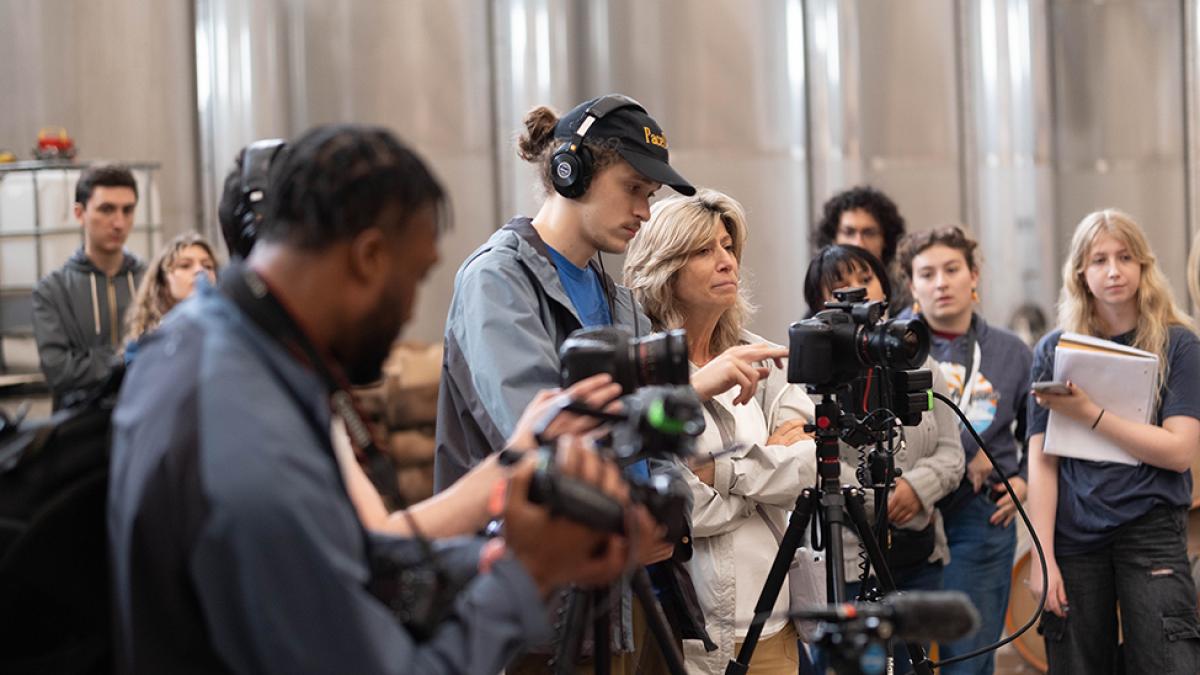Pace University’s documentary film team – PaceDocs – is set to premiere “The Cooper: Crafting the Soul of the Cask” at 7:00 p.m. on Thursday, May 2, 2024 at the Jacob Burns Film Center.
Pace University Awarded Two National Endowment for the Humanities Grants for Experiential Education

Funds to Support New Projects and Partnerships That Cement Pace as a Central Hub for Humanities in New York
Pace University was recently awarded $350,000 from the National Endowment for the Humanities (NEH) to advance experiential learning in humanities courses in partnership with cultural and service organizations in New York City. As a result, Pace University will serve as a central hub for humanities while showcasing its leadership in experiential education.
The two grants will fund the creation of new curriculum, teaching spaces, and projects that highlight the stories of marginalized people in the historical record through a series of public projects, such as the creation of oral histories, walking tours, digital maps and publications, websites, and community events.
“Pace is proud of our strong commitment to the humanities, civic engagement, and experiential learning,” said Pace University President Marvin Krislov. “These grants build on that foundation by recognizing the location of our University’s Lower Manhattan campus on unceded Lenape land and near the African Burial Ground. This grant will also support deeper exploration of our connections to the neighborhoods of Chinatown, Civic Center, Financial District, and South Street Seaport, in addition to providing our students with exciting new research opportunities to put the past in conversation with present challenges.”
A $150,000 grant supports a two-year project that brings Pace faculty together with staff from local cultural and service organizations—through the launch of a new Lower Manhattan Humanities Consortium (LMHC)-- to support and develop a portfolio of Pace undergraduate humanities courses, internships, and community engagement initiatives. LMHC partners include the NYC Department of Records and Information Services (DORIS), Municipal Archives Division; American Indian Community House; Bowery Residents’ Committee; Billion Oyster Project; South Street Seaport Museum; and Trinity Church Archives.
A second $200,000 grant will support the creation of three new teaching spaces for experiential humanities courses. More specifically, the funds will underwrite “The Ground Beneath Our Feet: Centering Place-Based Humanities in the Curriculum,” led by Director of Experiential Learning and the Pace Path and Associate Professor of English Kelley Kreitz, Ph.D., Assistant Provost for Research and Clinical Associate Professor of History, Maria T. Iacullo-Bird, Ph.D., and Co-Chair of the Department of English and Professor of English and Women’s and Gender Studies, Sid Ray, Ph.D.
The funds will support the construction of instructional spaces for humanities courses in Pace’s flagship building at 1 Pace Plaza in Lower Manhattan, led by Kreitz, Chair, and Professor of Film and Screen Studies Luke Cantarella, M.F.A., Associate Dean and Associate Professor of Art Charlotte Becket, M.F.A., Vice President for Development and Alumni Relations Gary Laermer, and Director of Campus Planning and Facilities Wayne Chen, AIA.
The experiential humanities approach is rooted in continuing innovations in Pace humanities courses and faculty-mentored research projects that address Pace University’s Lower Manhattan campus location.
According to Professor Ray, “We are focused on untold stories found in our partners’ archives and experiences: the oyster-farming Indigenous cultures that existed 14,000 years prior to the arrival of the Europeans, the first African Free Schools, and the African Theatre, Peale’s museum of curiosities, which included the first Chinese woman in New York City who was trafficked overseas and exploited, LGBTQIA+ folks forced to hide their truths for far too long, and our deep accountability to the people with whom we share our spaces, including the unhoused.”
Goals for the project include fostering community and collaboration among faculty, staff, students, and neighboring institutions; integrating the exploration of our neighborhood's past and present into our humanities core and degree programs; providing a model for enhancing the prominence of the humanities in higher education; and demonstrating how students trained in humanistic inquiry and methods are well prepared for graduate education and the twenty-first-century workplace.
“The Ground Beneath Our Feet project presents an opportunity on an unprecedented scale through LMHC partnerships to excavate the layered, intersecting, and often conflicting histories of Lower Manhattan,” said Assistant Provost Iacullo-Bird. “Undergraduate research will be embedded throughout the project in developing new interactive, research-infused, and immersive experiential learning.”
The new spaces will provide enhanced environments for courses that offer hands-on opportunities to learn in and with NYC communities—including a Storytelling Studio, Makerspace and Humanities Lab, and Multimedia Screening Room. The Storytelling Studio will serve as an updated seminar room, built for discussion, collaborative student projects, and hosting leaders of local cultural organizations and other community members. The Makerspace and Humanities Lab will enable students to explore and present their ideas through bookmaking and other forms of fabrication. The Multimedia Screening Room facilitates access to archival and new media in studying television, film, and related screen-based content.
“We are working toward a future in which the humanities are central within institutions of higher learning—and widely available within the daily lives of individuals and the shared experiences of communities,” said Kreitz. “We believe the humanities have a vital role to play in giving everyone a place in the world as makers of democracy.”
Both grants harness recent successes in the humanities at Pace to strengthen and center place-based, experiential learning. Total enrollment among first-year students entering Pace with a declared humanities major has been growing since Fall 2021. In spring 2023, Pace’s English department received national attention for its growth–by 47% in the past two years to about 150 majors–in defiance of national trends, which is credited to the program’s place-based, experiential approach.
The competition for the NEH awards was fierce: Pace is one of among roughly 30 institutions across the nation to receive funds for the distinct projects.
“It is my great pleasure to announce NEH grant awards to support 260 exemplary humanities projects undertaken by scholars, higher education institutions, and organizations of every size,” said NEH Chair Shelly C. Lowe (Navajo). “This funding will help preserve and expand access to community histories, strengthen the ability of small museums and archives to serve the public, and provide resources and educational opportunities for students to engage with history, literature, languages, and cultures.”
National Endowment for the Humanities
Created in 1965 as an independent federal agency, the National Endowment for the Humanities supports research and learning in history, literature, philosophy, and other areas of the humanities by funding selected, peer-reviewed proposals from around the nation. Additional information about the National Endowment for the Humanities and its grant programs.
About Pace University
Since 1906, Pace University has been transforming the lives of its diverse students—academically, professionally, and socioeconomically. With campuses in New York City and Westchester County, Pace offers bachelor, master, and doctoral degree programs to 13,600 students in its College of Health Professions, Dyson College of Arts and Sciences, Elisabeth Haub School of Law, Lubin School of Business, Sands College of Performing Arts, School of Education, and Seidenberg School of Computer Science and Information Systems.


